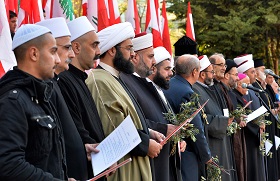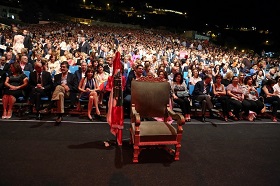It will soon be a year that Lebanon has been without a president. The members of parliament, who under the constitution have to elect the president by a two-thirds majority in the first round, have been unable to do so because the supporters of the main candiates (above all Michel Aoun) have been boycotting the election sessions.
It will soon be a year that Lebanon has been without a president. The members of parliament, who under the constitution have to elect the president by a two-thirds majority in the first round, have been unable to do so because the supporters of the main candiates (above all Michel Aoun) have been boycotting the election sessions.
However, the current presidential power crisis is fueled not by the fierce competition among political allies representing the interests of certain denominations and clans, but rather by the issuse of reforming electoral legislation. The lack of consensus on the issue caused the extention of the 2009 Lebanese parliament’s term: the powers of the Lebanese Council of Deputies were extended by a year-and-a-half in June 2013, and again until June 2017 in November 2014. The issue of electoral reform is pivotal for finding a compromise candidate to be the president of the Lebanese Republic.
The inter-party and inter-factional talks on this issue can roughly be divided into two tracks, namely, the “inter-Muslim” and “inter-Christian” tracks. While the first track (mainly between the heads of Hezbollah and Mustaqbal) is critical in terms of regional forces and trends, the second (chiefly between the Free Patriotic Movement and the Lebanese Forces) is essential for choosing the state leader, because these parties consist mainly of Maronites. The Lebanese President is elected from amongst Maronites.
There have been some positive shifts on both tracks since early December 2014. However, as early as January 2015, the talks between Hezbollah and Mustaqbal came under threat during a spike in the Lebenese Shiite resistance struggle with Israel (link in Russian). Even so, the talks on domestic Lebanese issues continued and may very well deliver a compromise both on presidential candidates (the powers expired in May 2014) and on controversial issues concerning election law. However, in recent weeks mutual accusations of obstructing democracy in Lebanon and the country’s sovereignty have increased. This is partly because of Saudi military actions in Yemen and partly because of continuing accusations that Iran has been using its protégé, Hezbollah, to prevent the election of the Lebanese president and thus perpetuate political uncertinaty in the country. However, the parties have continued their consultations: on April 14, 2015, the 10th meeting (since January) was held at the residence of Parliament Speaker Nabih Berri at Ain Kaf Al Tin, which was also the venue of the somewhat successful 11th round of talks of the March 8 and March 14 alliances (second link in Arabic). Specifically, the parties agreed on the need to ensure regular functioning of the constitutional power institutions, notably the Council of Deputies. However, it is worth noting that there is no information about the meeting on the official Al-Manar and Al-Mustaqbal websites.
At the same time, talks were under way in winter and spring 2015 between the Free Patriotic Movement (FPM) and the Lebanese Forces (LF), whose leaders both ran for president, and most of the parliament’s sessions on presidential elections were boycotted by Michel Aoun’s Change and Reform bloc. Finally, on May 9, 2015, a breakthrogh was achieved in the talks: the long-awaited declaration of intent, which has not yet been published but has come into force, addresses the issues of the structure, broader administrative decentralization, land tenure, pesonal status, mutual participation in forming state budget items, the problem of citizenship for Lebanese-born foreigners, etc. The parties have agreed to take part in the forthcoming parliamentary sessions on condition that the agenda includes reform of the Election Law and a draft law on the naturalization of Lebanese nationals abroad. The latter point is exceptionally important for several Lebanese parties (including, of course, the FPM and the LF), whose supporters are multiplying abroad in economically robust and politically active Lebanese diasporas across the world. For its part, the Kataeb Party – another key pro-Maronite party – is pressing for an early reform of electoral law and the election of a new president. Until recently, the party was seriouisly considering joining the boycott of the parliamentry session if electoral reform were not included in its agenda.
Progress in the talks among the main rivals in Lebanon’s Christian political camp defused the tensions between the supporters of Michel Aoun and Samir Jaji, especially among students.
Social tensions caused by domestic Lebanese problems reached an unprecedented pitch. The lack of hope for an early solution to the issues of Syrian refugees in Lebanon (who make up more than a third of the country’s popolation), the dire internal security situation, low wages and high unemployment are compounded by the political differences that developed during the long-drawn-out power crisis.
The straw in the wind signalling that a way out of the crisis is possible is a chance the Lebanese state must use if it is not to commit a fateful mistake. The authorities clearly underestimate the fact that the population is weary of domestic political turmoil, underestimate the growing protest potential and the loss of trust in democratic institutions. That Lebanon has been lucky to be spared the “wave of turbulence” need not be cause for the authorities to be complacent. All the more so since the 2011 protests in Arab countries can hardly be linked directly with the problems of ethnic and confessioal relations: we are looking at grassroots protests against the social irresponsibility of the authorities, economic mismanagement or just plain inaction and dereliction on the part of politicians in the face of real threats of intervention and invasion by Jihadists, something the army leadership has been openly warning about.
The presidential candidate vote at the Lebanese Council of Deputies planned for May 13, 2015 is likely to fail again, just like the previous 22 attempts: the conditions for success have not yet matured. Having fixed the next date, Speaker of Parliament Nabih Berri is still hopeful. True, he declares that he hopes to bring about a full consensus between the opposing Maronite parties on the main points of differnce, a mediatory mission spanning both the Muslim and Christian spectrums that is reminiscent of the efforts once exerted within the National Dialogue by President Michel Suleiman.






